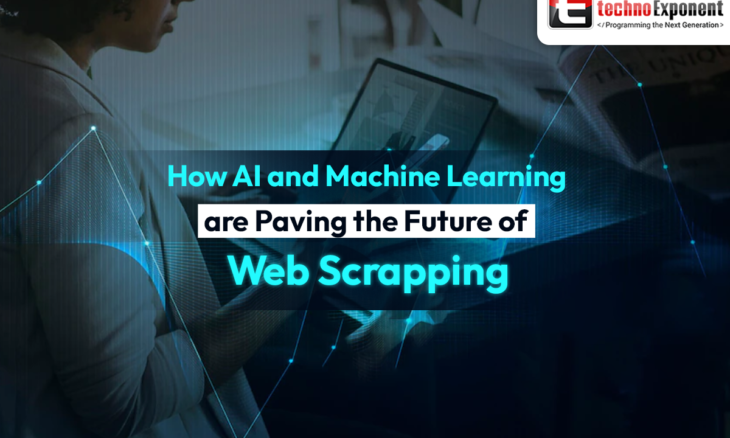
Data is the new currency, and that’s nothing that you don’t know already. Every organization seeks the superpower of gathering, analyzing, and interpreting vast amounts of data to stay ahead of its competitors. Web Scrapping is basically the process of collecting data from other websites, and this process is famous for being a bit tedious, time-consuming, and prone to errors.
And that’s where AI and ML come in as the savior to make the whole process of collecting and analyzing data accurate and efficient. Now the real question is how AI-driven web scraping is helping organizations unlock the full potential of data. So let’s cut to the chase and find out the benefits of leveraging AI and machine learning for web scraping.
What is AI-driven web scrapping?
As I’ve said earlier, web scraping is the process of collecting data from websites. Organizations use software to extract information from web pages and store them in databases or spreadsheets. Until recently, this whole process was manual and involved using few tools or software.
But with AI entering the scene, this process went to the next level. Now AI & ML algorithms extract and analyze data from websites making the whole process more precise, accurate, and efficient. This AI revolution in the field of web scraping has helped organizations boost their productivity.
Examples of AI-driven web scraping
- Natural Language Processing (NLP) is a prime example. It’s a branch of AI that helps a machine understand and manipulate human language. NLP comes in handy for extracting data from text-heavy websites, for example, blogging sites. It also helps in gaining insights from data obtained from social media: this is known as sentiment analysis.
- Computer Vision (CV) comes second in line. It allows the extraction of meaningful information from visuals. Organizations can leverage computer vision to extract information from images and videos across sites. It is really useful for analyzing customer behavior and market trends.
Benefits of leveraging AI for web scraping
Key benefits of using AI for web scraping include:
Quicker data collection: AI-driven web scrapping tools can help in quickly extracting data from multiple sources simultaneously.
Enhanced data quality: AI-based web scraping tools remove error and inaccuracy and extracts reliable data efficiently.
Better insights: Since these AI tools can extract information from multiple sources, they give away a better idea of customer behaviors and market sentiments.
Reduced costs: If you’re scraping data manually, you’ll need to hire someone, but if you adopt AI, you will cut down your expenses in the long run.
Are AI and ML the future of web scrapping?
With the recent AI and ML uprising, the future of web scrapping looks promising. They can significantly impact the whole data-gathering process as they have the power to improve accuracy and automate things. Organizations can train AI & ML algorithms to recognize patterns in website data and extract relevant information easily.
AI & ML also brings the ability to adapt to constantly changing website structures, while manual web scraping couldn’t do the same. So overall, when we weigh the possibilities, we see AI & ML revolutionize web scraping for the greater good. And with AI & ML applications releasing every now and then, we can expect to see more innovation in the field of web scraping.
Popular AI-powered web scraping tools
Here are some popular AI-driven web scraping tools that are making headlines:
- ParseHub
- Import.io
- Octoparse
- ScrapingBee
- Diffbot
- BrightData
- Apify
(The aforementioned names are in no particular order)
Concerns associated with AI-driven web scrapping tools
These new-age web scraping tools pose several potential concerns:
- Web scraping can be deemed illegal if it goes against the terms and policies or copyrights or intellectual property rights of websites. One might get banned from a website or have their IP address blocked for starters.
- Every country has laws regarding the collection of data, and AI-driven tools might make it difficult for an organization to comply with those laws.
- Over time and time again, web scraping has raised ethical concerns. AI-driven tools can scrape sensitive or personal data which might violate a person’s privacy rights, leading to bigger problems.
- If these AI tools are scraping unstructured data sources, then there is room for errors. They might create inaccurate data sets, so there’s a big question if businesses should rely on them for decision-making.
- Web scraping can raise security concerns for the IT infrastructure of a company if the scrapped data is sensitive.
- AI tools might not be able to collect data effectively if the targeted websites have taken measures against web scraping.
Conclusion
To sum it all up, AI and machine learning can revolutionize web scrapping in the future by improving accuracy, automation, and efficiency. It can help organizations unlock the full potential of data, help them innovate, gain a competitive edge and make informed decisions. Though there are a few drawbacks, we would still encourage our readers to explore AI-driven web scraping tools to boost their data collection capabilities in this evolving digital landscape.
 +44 141 628 8980
+44 141 628 8980
 (786) 269-2247
(786) 269-2247
 +61 872007153
+61 872007153
 +91 8900027268 (Sales only)
+91 8900027268 (Sales only)








